Top 10 API Security Testing Tools
10 Best API security testing tools to help organizations protect their APIs from vulnerabilities and cyberattacks.

Muze
Oct 9, 2024
API scanning tools or security testing tools are the best way to ensure that the APIs function as designed to offer adequate protection from harmful cyber attacks. However, the availability of many API security testing tools or API security scanning tools sometimes makes it challenging to pick the best one.
This blog explores the top API security scanning and testing tools available on the market, along with their importance and how they work.
Let's get started
What is an API Security Scanning Tool?
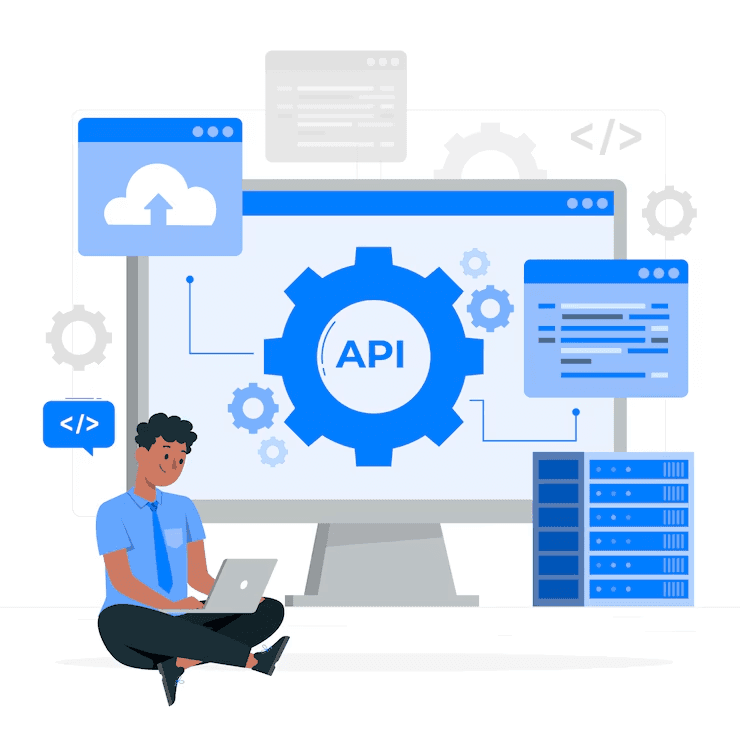
An API security scanning tool is a software solution designed to identify and assess security vulnerabilities in Application Programming Interfaces (APIs). APIs are essential for enabling communication between different software systems, but they can also present significant security risks if not properly protected.
API scanning/security testing is the automated inspection of APIs to uncover vulnerabilities and security threats. This process involves the analysis of each API endpoint to detect insecure configurations, misconfigurations, inappropriate data handling, and any other security flaws.
API scanning tools reduce security risks and facilitate proactive remediation by identifying vulnerabilities early in the development lifecycle. Since APIs often handle sensitive data, breaches can lead to data theft, financial damage, and system compromise. API security scanning tools ensure that APIs are secure from the start, which minimizes security breaches and remediation efforts.
10 Best API Security Testing Tools
Akto - Comprehensive API Security and testing platform.
Cequence - API Security and Bot management solution.
APIsec - Automated API Security Testing Platform.
AppKnox - Mobile App Security Testing Solution.
BeSecure - Vulnerability Assessment and Management Tool.
42Crunch - API Security scanning and testing tool.
Probely - Web Application and API vulnerability scanner.
Synopsys API Scanner - API Security scanning and testing tool.
IBM AppScan - Comprehensive Application security testing tool.
Postman – API development and testing tool with security features.
Here is the list of the top 10 API security scanning tools or API security testing tools that security engineers need to know about:
1. Akto
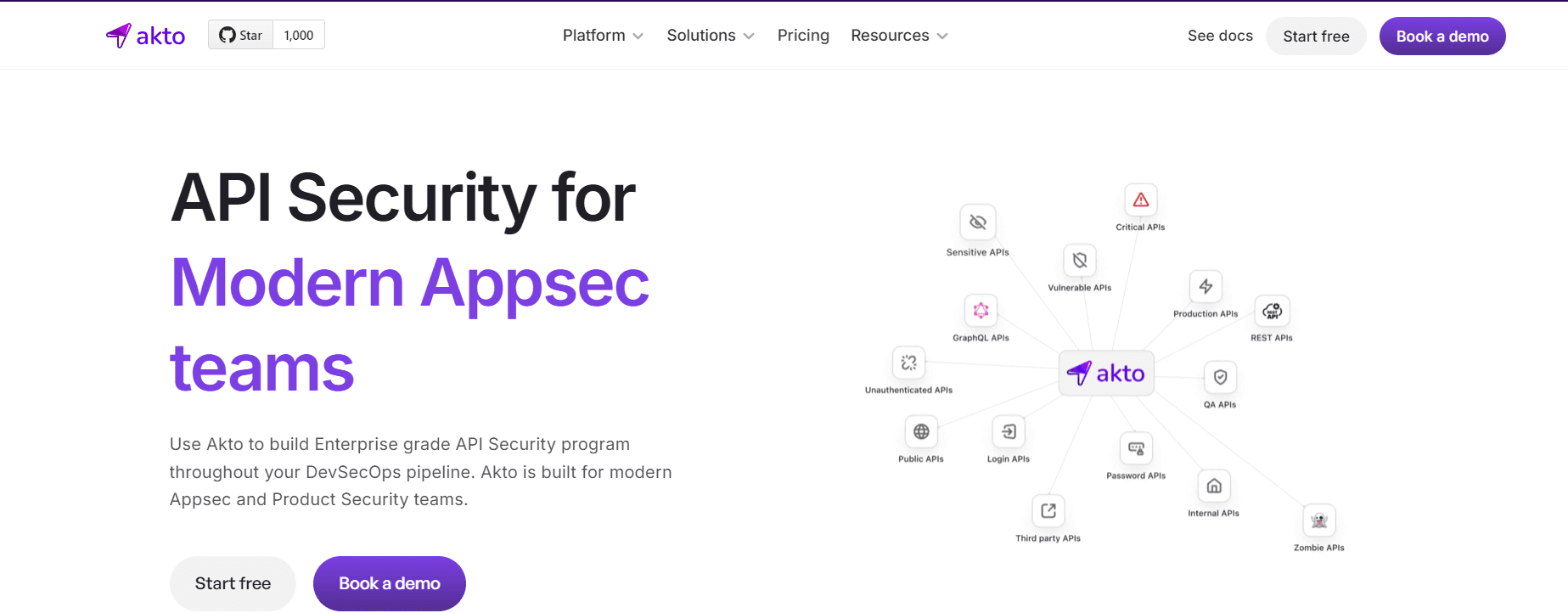
Akto ranks among the top API security testing platforms available today. The platform offers features such as API discovery and automated testing/scanning facilities. Akto analyzes data traffic robustly and runs various business logic tests to identify OWASP's 10 bugs. Its frictionless integration with platforms like AWS makes Akto an excellent choice.
Key Features
Automatically discovers all APIs in the organization’s system.
Conducts over
400 built-in security testsfor vulnerabilities.Identifies and protects sensitive data exposed through APIs.
Continuously monitors and manages the API security posture.
Ensures robust authentication and authorization security.
Seamlessly integrates into
CI/CD pipelinesfor continuous testing.
Pricing
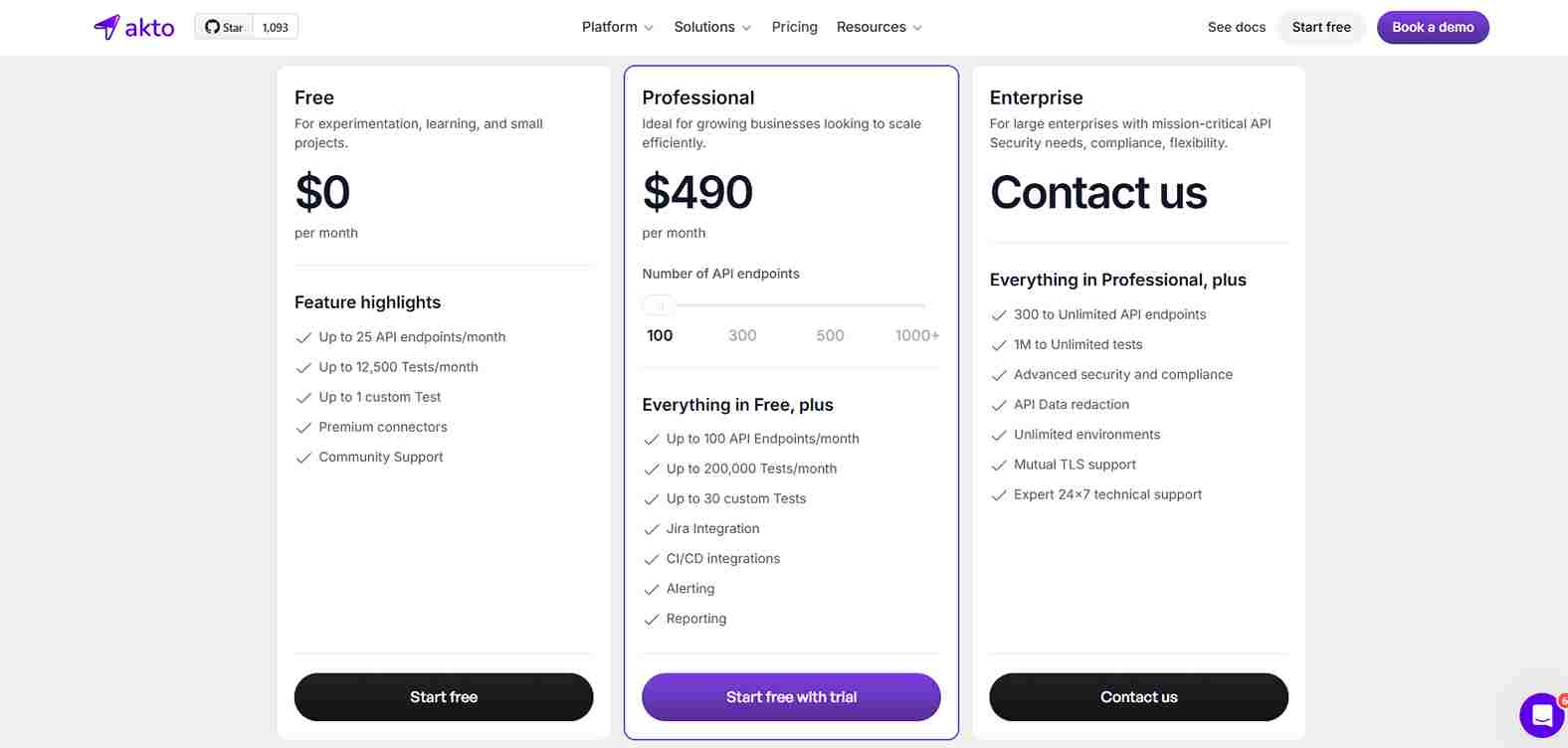
Akto offers flexible pricing plans to accommodate various organizational needs:
Free Plan: This plan is apt for individuals or small teams wishing to test Akto features or perform light API security testing. It supports up to
25 API endpointsper month with12,500tests performed in a month. As this plan is limitedly scalable, it would fit the bill of early-stage developers or organizations testing out API security without major cost factors.Professional Plan: This costs at
$490per month. It caters for as many as 100 API endpoints, allowing for up to200,000tests within a month. The features contained herein ensure the automation of the process of API security with regard to mid-sized teams, finding a balance between its cost and functionality.Enterprise Plan: For large enterprises with complex and critical API security needs, this plan provides more customization, increased scalability, and premium features. While security engineers can get quotes for this plan, it is designed for organizations that require extensive API testing capabilities and robust support.
2. Cequence
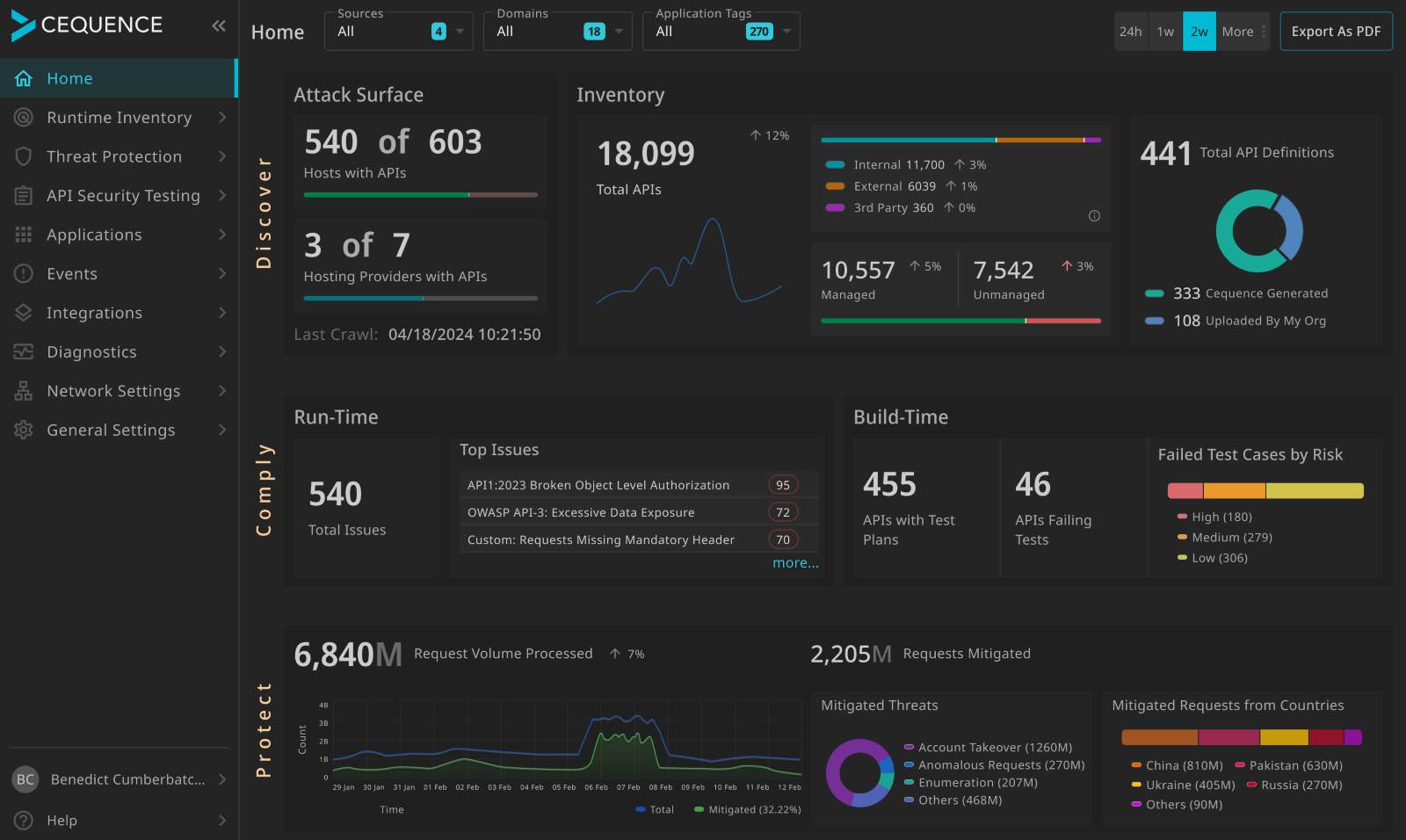
Image Source: Cequence Security
Cequence Security is a specialized API security platform aimed at detecting and protecting from different types of API threats. It stands out because it uses machine learning and advanced analytics to identify risks in APIs and prevent malicious attacks. Using Cequence, organizations can secure their APIs in real-time across different environments: multi-cloud and on-premises infrastructures.
Key Features
Uses behavioral analysis to detect anomalies and stop API abuse.
Comprehensive protection against
OWASP API Top 10vulnerabilities.Scalable for enterprises and offers deep visibility into API traffic.
Pricing
Cequence Security does not publicly disclose specific pricing information for its Unified API Protection platform. The cost of its solutions can vary based on factors such as the size of the organization, the number of APIs, and specific security requirements. To obtain detailed pricing tailored to organizational needs, it's recommended to contact Cequence Security directly through its official website.
3. APIsec
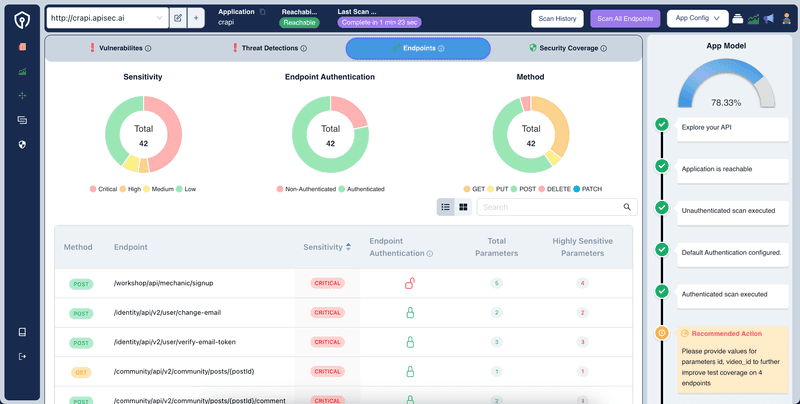
Image Source: APIsec
APIsec is another efficient API security testing tool that provides automated services for the comprehensive analysis of APIs. Application security engineers can use the platform for discovering, ingesting, and analyzing APIs, and thus enable the creation and execution of various custom attack scenarios against each application.
Key Features
Supports both scheduled and manual API security tests, ensuring APIs are free from vulnerabilities.
Tests various facets of an API, covering the OWASP API Top 10 and similar categories.
Identifies security vulnerabilities early in the SDLC.
Pricing

Image Source: APIsec
APIsec offers a range of pricing plans to accommodate various API security testing needs:
Free Plan: This plan, designed by APIsec for single users, provides a
cloud-only scannerwith community support, allowing users to test their APIs at no cost.Pen Test Edition: APIsec has priced this plan at
$325 per monthfor up to100 endpoints. It includes a30-day trialand offers features such as OWASP API Top 10 coverage, authenticated testing, and internal API scanning.Standard Plan: At
$650 per monthfor up to100 endpoints, this plan builds upon thePen Test Editionby adding premium support and additional security testing capabilities.Pro Plan: For
$2,600 per monthfor up to100 endpoints, the Pro Plan includes all features of the Standard Plan, along with business logic testing, custom-branded reports, and integrations with CI/CD pipelines and API gateways.
4. AppKnox
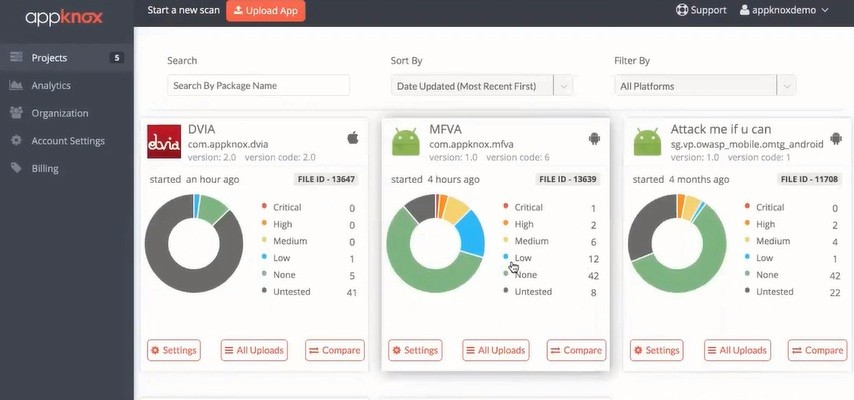
Image Source: AppKnox
Mobile security, as offered by AppKnox, would rely on identifying vulnerabilities present within mobile applications and APIs through mobile-first approaches. Being pretty user-friendly, small-sized security teams can very efficiently conduct vulnerability assessments that are devoid of complex configurations required within this application. Aspects like SQL injections, cross-site tracing, command injection, and many other concerns about security issues would have in-depth insights regarding all such vulnerabilities by combining manual API scanning techniques with automatic scans.
Key Features
Automated as well as manual API vulnerability scanning.
It identifies the existence of critical issues like SQL injection, XSS, and command injection in HTTP requests.
A user-friendly dashboard with detailed vulnerability reports to quickly remediate.
Pricing
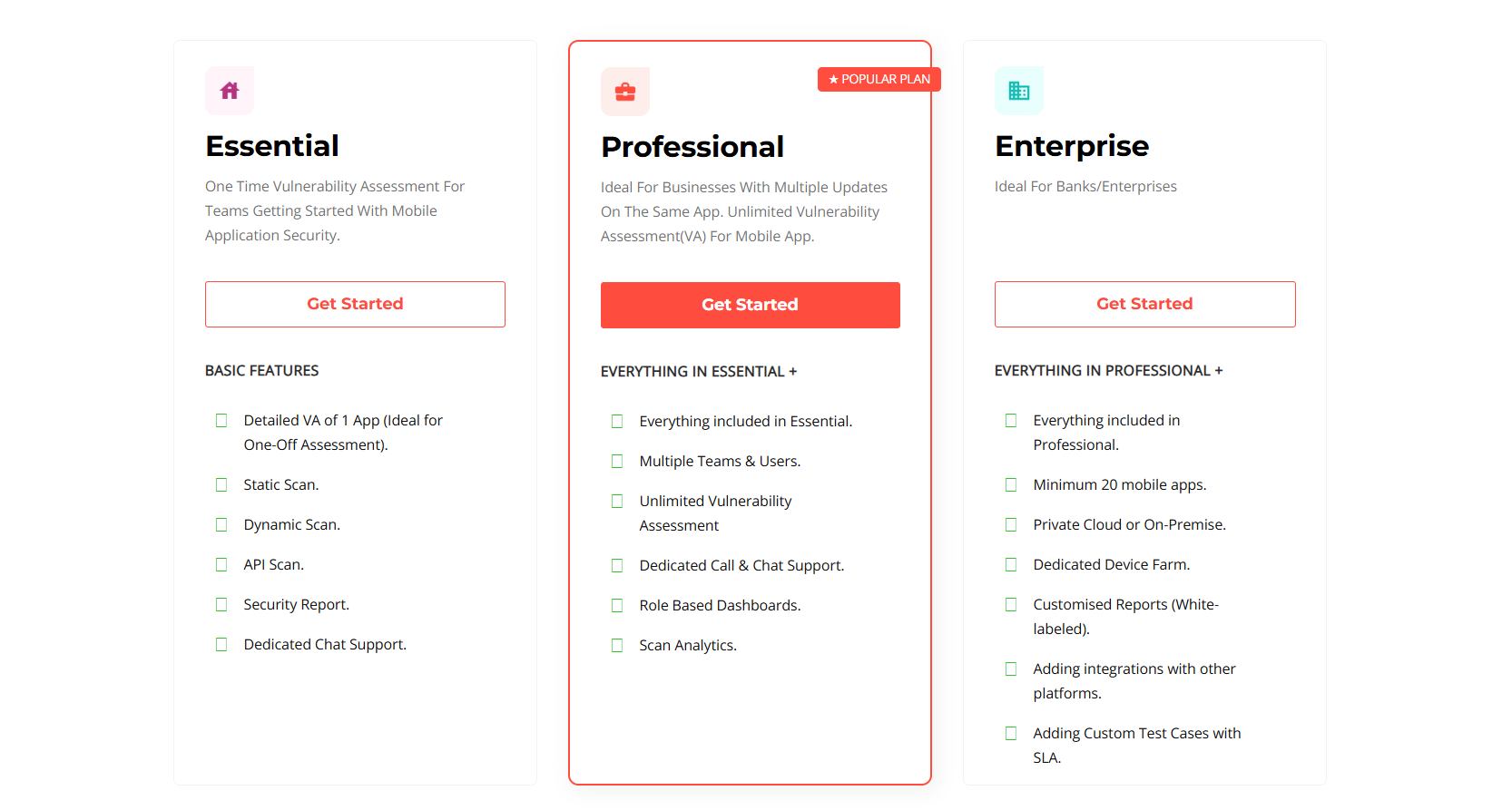
Image Source: Appknox
Appknox offers flexible, usage-based pricing tailored to various organization’s needs. Their plans are categorized into Vulnerability Assessment (VA) and combined Vulnerability Assessment & Penetration Testing (VA+PT), each with distinct tiers:
Essential Plan: Designed for teams initiating mobile application security, this plan provides a detailed assessment of a single app, including
Static Application Security Testing(SAST),Dynamic Application Security Testing(DAST), API Testing, and a comprehensive security report.Professional Plan: Ideal for organizations managing up to
20 apps, it involves all essential features, with added support for multiple teams and users, unlimited vulnerability assessments,role-based dashboards, scan analytics, and dedicated call and chat support.Enterprise Plan: Suited for businesses with extensive security requirements, this plan includes all Professional features, supporting a minimum of
20 mobile apps. The plan offers deployment options on private cloud or on-premise,customized white-labeled reports, integration with other platforms, and the addition of custom test cases with specifiedService Level Agreements(SLAs).
5. BeSECURE
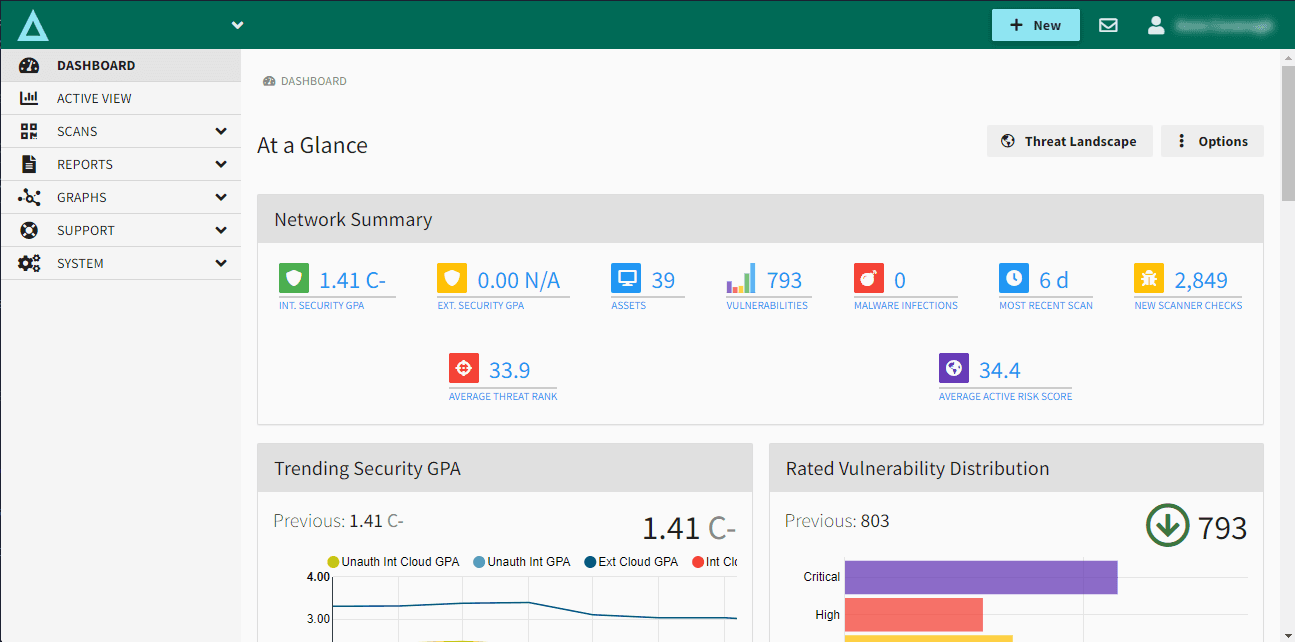
Image Source: BeSECURE
BeSECURE by Beyond Security provides a complete solution for API security testing and vulnerability assessment. It is designed to help organizations continuously scan and assess their API ecosystem for potential threats.
With a focus on eliminating false positives and negatives, beSecure provides reliable, actionable results. The platform continuously monitors API traffic and helps prevent misconfigurations and security loopholes that attackers might exploit.
Key Features
Provides excellent workflow capabilities for protecting APIs.
Continuously scans network vulnerabilities in the organization's systems.
Eliminates false positives and negatives for powerful API testing.
Pricing
Beyond Security does not publicly disclose specific pricing details for BeSECURE, as costs can vary based on factors like the size of the organization, the number of IP addresses to be scanned, deployment preferences (cloud-based, on-premises, or hybrid), and additional features required.
To obtain accurate and tailored pricing information, it's recommended to contact Beyond Security directly. They offer personalized quotes to align with an organization's specific security needs and infrastructure.
6. 42Crunch
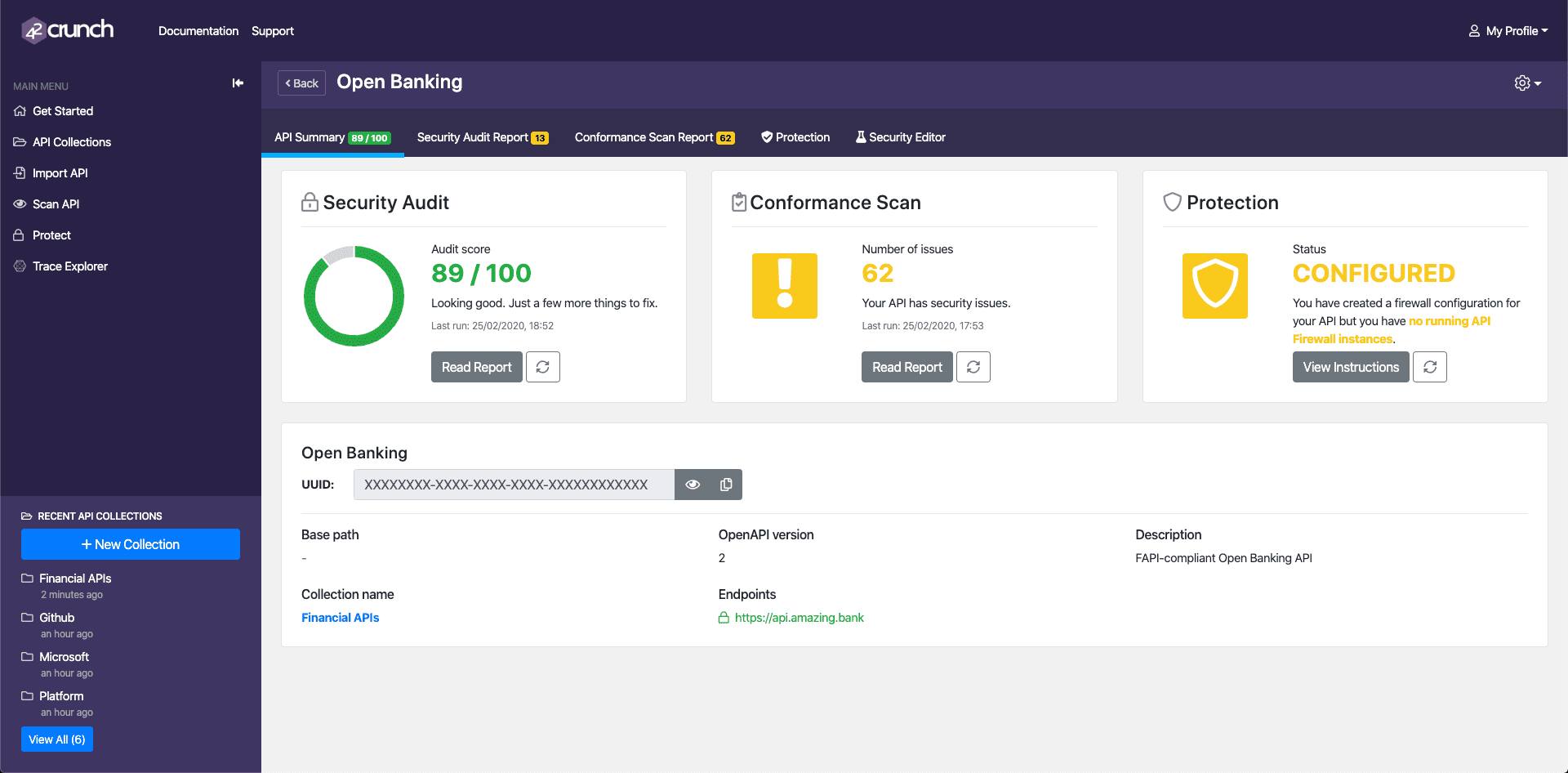
Image Source: 42Crunch
42Crunch is an API security scanner and security testing software for the detection and testing of vulnerabilities in APIs. It mainly boasts of having an advanced API Security audit tool that scans and tests the files of OpenAPI definition primarily. It is quite well-rounded and provides all the necessary aspects, such as static analysis, dynamic testing, and runtime protection in API security. It is further allowing possible integration with well-known development tools and CI/CD pipelines through 42Crunch and giving the security team all possibilities to introduce API security to their existing workflow rather with much ease.
Key Features
Conducts a detailed API scan that automatically generates a report capturing several vulnerabilities, such as
weak authentication mechanismsand data leakage.Offers dynamic API testing capabilities in addition to static analysis.
Provides a comprehensive solution that applies to runtime protection and every step of the API lifecycle.
Pricing
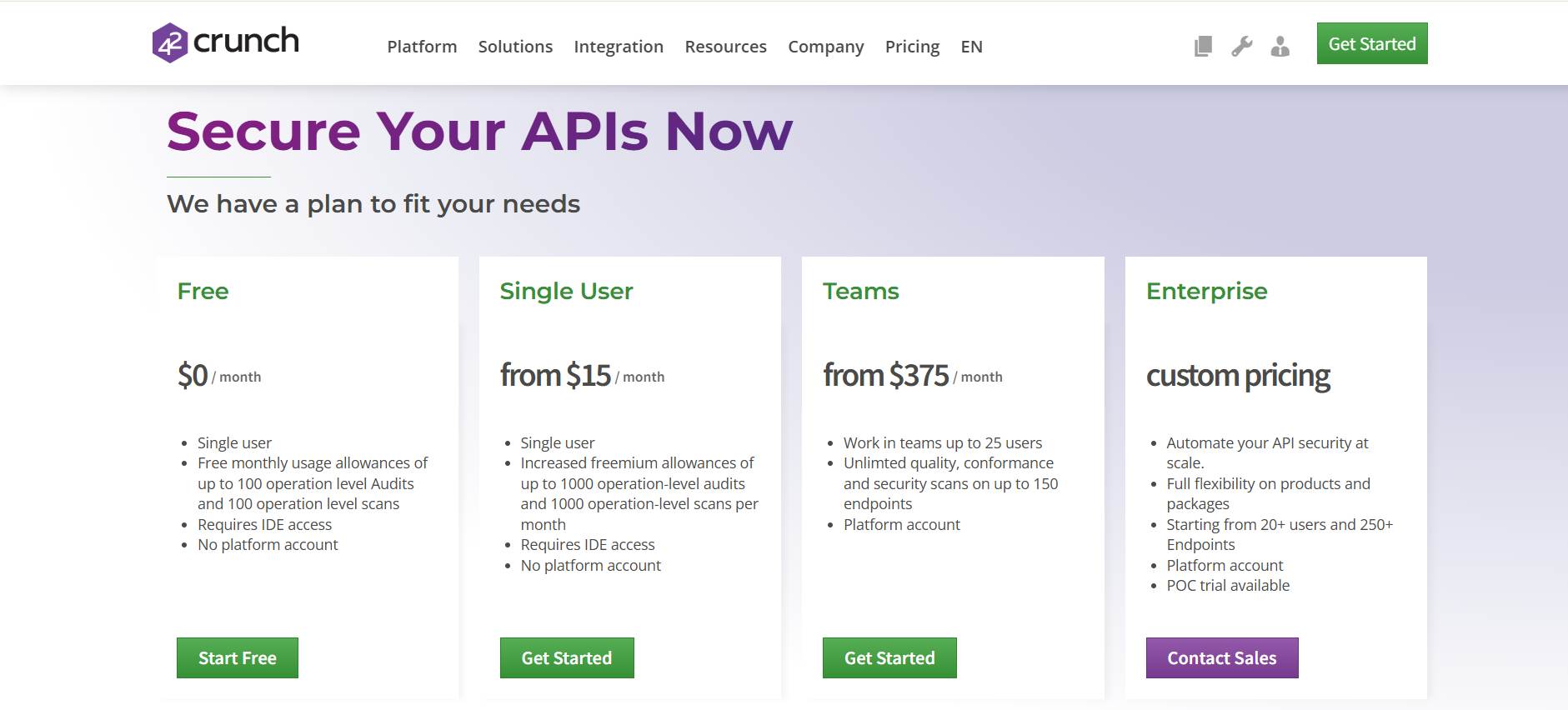
Image Source: 42Crunch
42Crunch offers a range of pricing plans tailored to different user needs:
Free Plan: Designed for individual users, this plan provides up to
100 operation-level auditsand100 operation-level scans per month. This plan limits access to IDE integrations and excludes a platform account.Single User Plan: Aimed at individual users requiring higher usage limits, this plan offers up to
1,000 operation-level auditsand1,000 operation-level scansper month. Similar to the Free Plan, it operates through IDE access without a platform account.Teams Plan: Ideal for collaborative environments, this plan supports up to
25 userswith unlimited quality, conformance, and security scans on up to150 endpoints. It includes a platform account, enabling role-based sharing of APIs, and customizable security features.Enterprise Plan: Tailored for large organizations, this plan offers full flexibility on products and packages, starting from
20+ usersand250+ endpoints. It provides a dedicated platform account with customizable security audits, scans, and integration options.
7. Probely
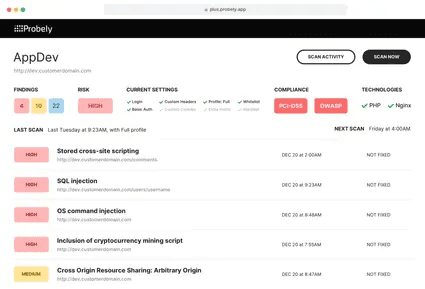
Image Source: Probely
This API security testing tool helps to automate and scale security testing within software development and CI/CD (continuous integration, continuous development) pipelines. In addition to a user-friendly interface, the platform offers in-depth scanning capabilities.
Key Features
Features an automated web API vulnerability scanner with robust API testing/scanning capabilities to detect several vulnerabilities.
Provides advice on fixing vulnerabilities, allowing security engineers to solve various security issues.
Offers powerful authentication support to quickly test and scan APIs.
Pricing
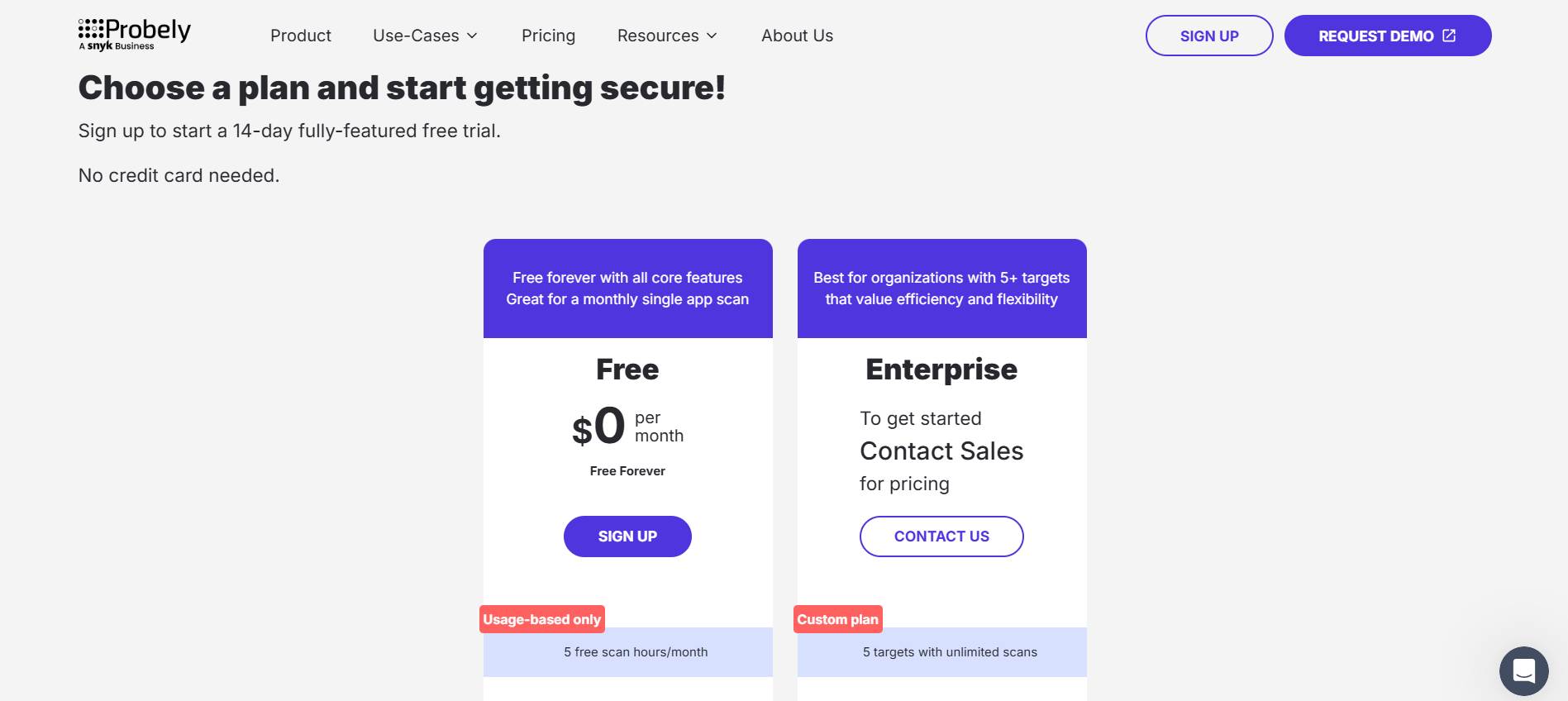
Image Source: Probely
Probely offers two primary pricing plans:
Free Plan: Probely designs this plan for users who need basic security assessments. It includes all core features and allows for one target with up to five scan hours per month.
Enterprise Plan: Tailored for organizations with more extensive security requirements, the Enterprise plan involves all features of the
Free planand adds advanced functionalities such asasset discovery, unlimited users, custom roles and permissions, internal target scanning via agents, integrations with tools likeSlack and Jira,single sign-on(SSO), compliance reports, a dedicated account manager, and priority support. Probely customizes pricing for this plan based on specific organizational needs, and it encourages interested parties to contact Probely's sales team for a personalized quote.
8. Synopsys API Scanner
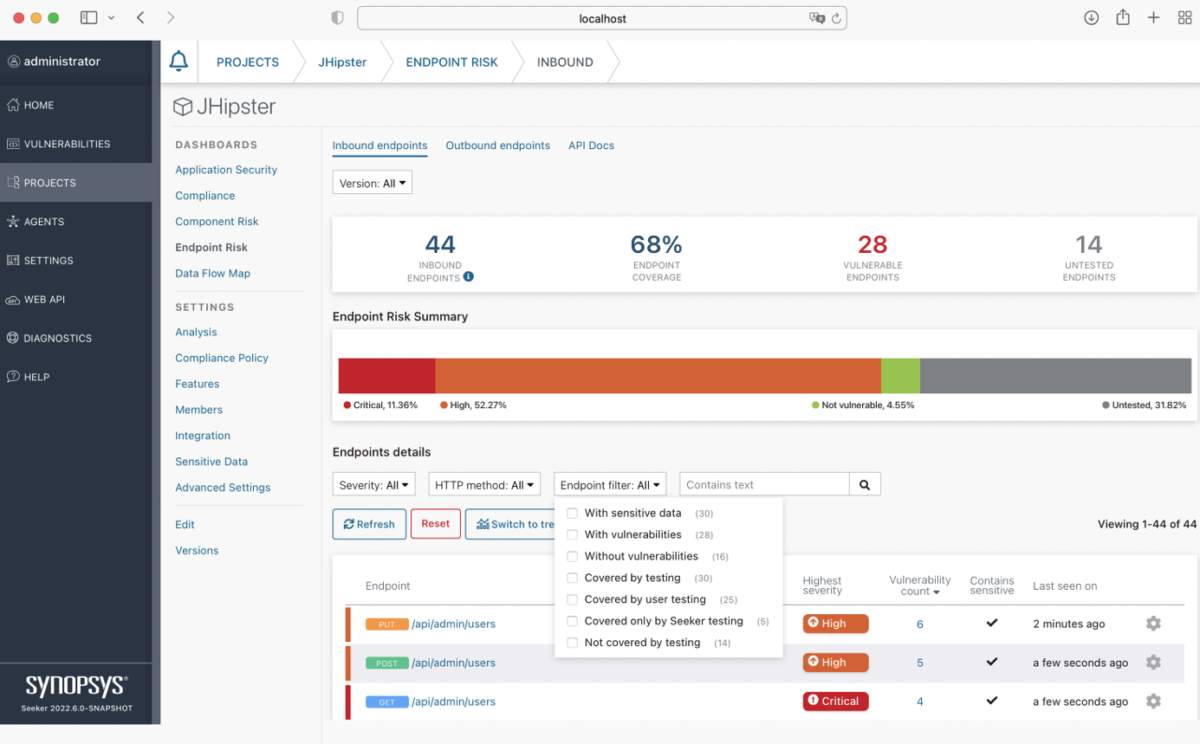
Image Source: Synopsys API Scanner
Synopsys API Scanner is a powerful API security scanning and security testing tool that transforms how organizations build and deliver software. The tool aligns people, processes, and technology to address various software risks throughout different stages of the application lifecycle.
Key Features
Maps out all paths and the logic of an API, from parameters to endpoints, authentications, and specifications.
Integrate into the development process with seamless provision of secure and faster code.
It manages application security, quality, and compliance risks at the speed the organization demands.
Pricing
Synopsys does not disclose pricing for these tools. The price will depend on the size of the organization, specific requirements, and preferences for deployment. To get the right and accurate pricing, it is advisable to contact the sales team of Synopsys through their official avenues. They can give a custom quote based on the requirement of the organization.
9. IBM AppScan
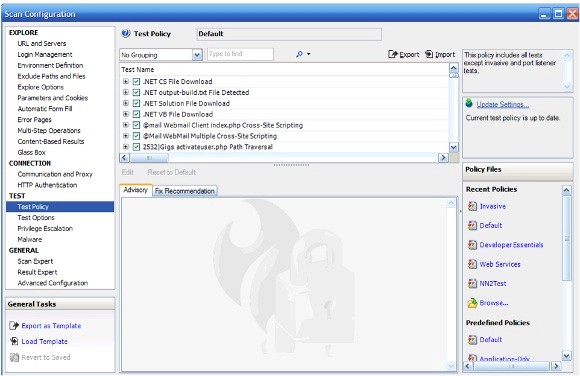
Image Source: IBM AppScan
IBM AppScan is the most powerful application security testing tool, with API security testing features that are unmatched. It will detect vulnerabilities in APIs, web applications, and mobile applications without human intervention.
AppScan emphasizes exposing the most common vulnerabilities found, including those on the OWASP API Top 10, and further offers advanced scanning techniques that support both static and dynamic security testing. It allows developers to include the scanning during the whole SDLC while ensuring that APIs are checked at all times and problems detected as early as possible.
Key Features
Supports both static (SAST) and dynamic (DAST) API security testing to identify vulnerabilities.
Detects and helps remediate OWASP Top 10 risks, including
injection flaws, insecure authentication, and misconfigurations.Integrates seamlessly with
CI/CD pipelinesfor continuous testing and security validation.Provides detailed reports with actionable insights for remediation, allowing security teams to prioritize issues based on risk levels.
Pricing
HCL AppScan, which was IBM AppScan, provides a range of application security testing solutions, including dynamic (DAST), static (SAST), interactive (IAST), and software composition analysis (SCA) tools.
HCL AppScan does not provide pricing details publicly, as this can vary with the deployment model, modules required, and the needs of the organization. To get accurate and tailored pricing information, it is advised to reach out to HCL Software directly or request a quote through their official channels.
10. Postman
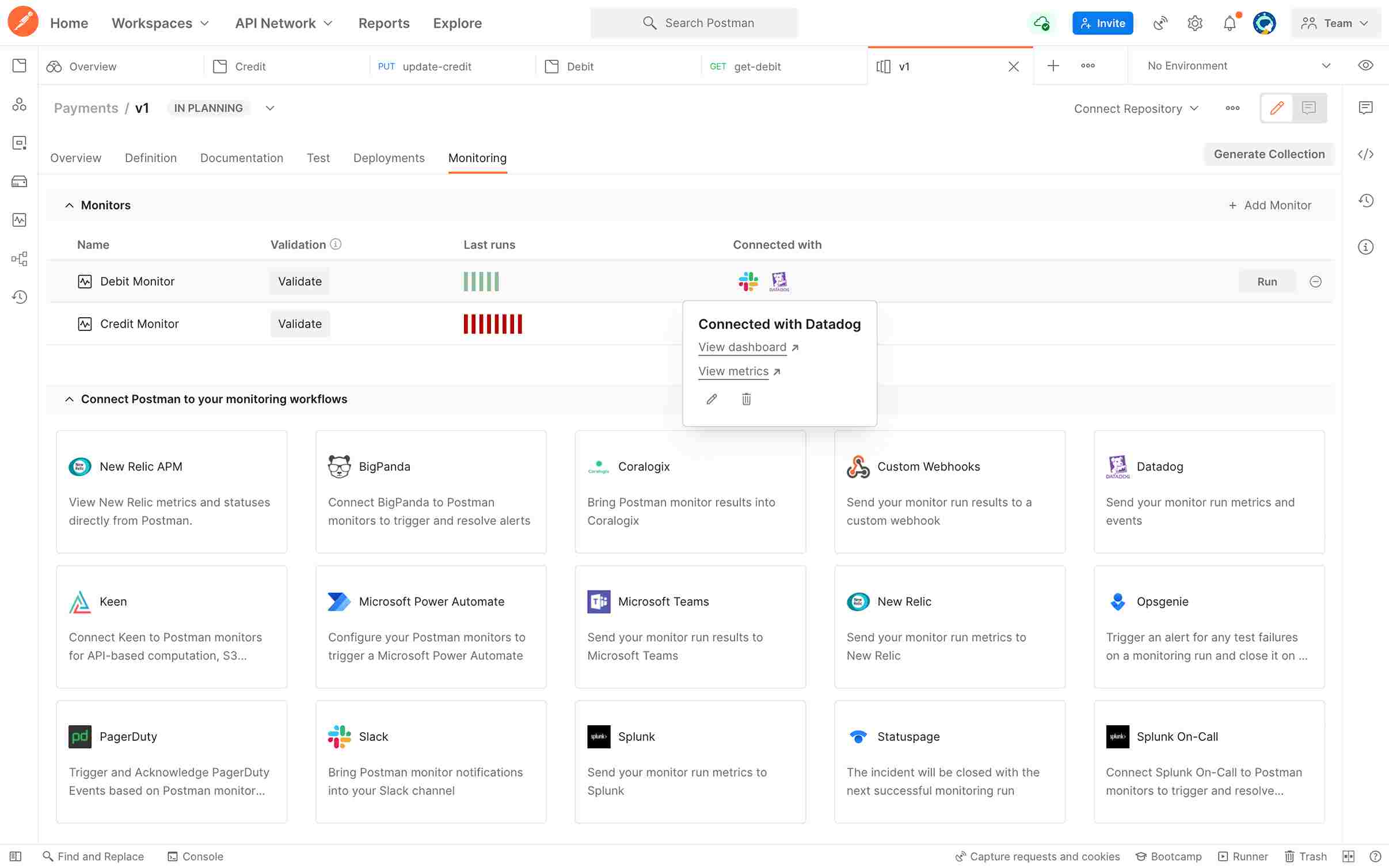
Image Source: Postman
Postman is primarily known as an API development tool, but its security testing capabilities have become increasingly robust. It allows developers and security teams to automate API testing with features like request automation, scripting, and dynamic variable handling. Postman can help identify security risks during API development by supporting integration into CI/CD pipelines, allowing for consistent and automated API testing throughout the lifecycle.
While Postman doesn't specialize in API security testing like some other tools, it offers enough flexibility for security and development teams to build custom security tests and validate the integrity of their APIs. It's ideal for developers who need both functional and security testing in a user-friendly environment.
Key Features
Provides automated and customizable API testing.
Supports integration with CI/CD pipelines for continuous testing.
Ideal for functional API testing, but flexible enough to handle security testing scenarios.
Pricing
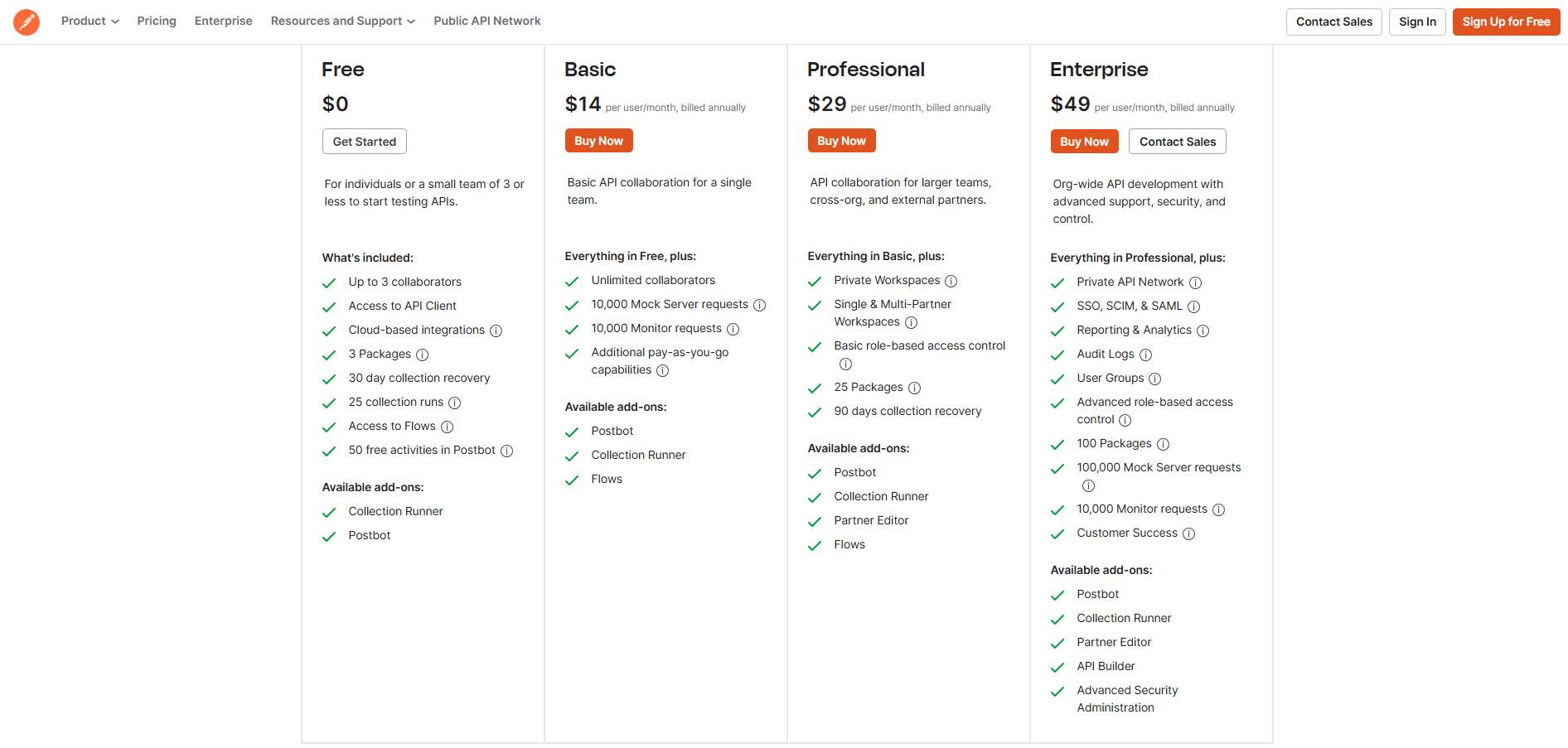
Image Source: Postman
Postman offers a range of pricing plans to accommodate various user needs:
Free Plan: Postman designed the Free Plan for individuals or small teams of up to
three members, providing essential API testing features at no cost.Basic Plan: At
$14 per user per month (billed annually), this plan includes unlimited collaborators, cloud-based integrations, and increased limits on mock server and monitor requests.Professional Plan: Priced at
$29 per user per month (billed annually), it offers private workspaces, role-based access control, and additional packages for larger teams.Enterprise Plan: For
$49 per user per month (billed annually), this plan provides advanced security features,single sign-on(SSO), audit logs, and customer success support for organization-wide API development.
Importance of API Security Testing Tools
API security testing tools have become very important in today's digital world, being critical components in the protection and validation of API implementations. Here's why these API security tools are important for organizations:
1. Identifying Vulnerabilities
API security testing tools or API scanning tools are very important in finding weaknesses in APIs before malicious actors can exploit them. Common vulnerabilities include injection attacks, improper authentication mechanisms, misconfigured security headers, and sensitive data exposure.
These tools allow organizations to carry out comprehensive security assessments and find areas of concern. Organisations, by identifying and dealing with vulnerabilities proactively, mitigate the risk of breaches but, more importantly, improve the security posture of their systems in the process.
2. Securing Sensitive Data
APIs often handle highly sensitive information, including user credentials, payment details, and healthcare data. Security testing tools ensure that they robustly protect APIs against unauthorized access, interception, or breaches.
These tools help organizations identify weak points in data handling and storage processes by simulating attack scenarios and examining data flow. Industries such as finance, healthcare, and e-commerce particularly benefit, as maintaining the integrity and confidentiality of sensitive data is not only a best practice but often a regulatory requirement.
3. Ensuring Regulatory Compliance
Many organizations cannot negotiate compliance with data protection regulations such as GDPR, HIPAA, and PCI DSS. API scanning tools help in aligning APIs with these regulatory frameworks by identifying gaps in security controls.
They give actionable insights for remediation of non-compliance issues so that APIs strictly meet standards on data handling and protection. These tools power regular security audits, hence helping maintain compliance and preventing the risk of legal and financial penalties.
4. Streamlining Security With Automation
Modern API scanning tools rely on automation to make this process much faster and more effective. Such tools can easily get integrated into Continuous Integration/Continuous Deployment (CI/CD) pipelines, so developers and the application security engineers can find vulnerabilities during regular security reviews throughout the development lifecycle of an application. The effort applied is lessened through this automation, and vulnerabilities appear sooner, making security is not a mere afterthought.
5. Building a Proactive Security Posture
Incorporating API security testing early in the development process fosters a proactive approach to risk management. These tools provide valuable insights into potential threats and allow development and security teams to implement necessary safeguards before APIs go live. A robust security posture not only minimizes the likelihood of breaches but also enhances user trust by demonstrating a commitment to protecting their data.
How do API Security Testing Tools Work?
Understanding how API security testing tools function is crucial for implementing effective security measures. Let's explore the key components and processes that make these tools essential for protecting the APIs.
Understanding API Functionality
The foundation of API security testing is well based on understanding the API and its intended use cases, which involve delving into the API's design, reading the documentation, and then understanding its expected behavior. That way, there would be a good baseline from where to start testing how it interacts with systems.
Creating a Testing Plan
Having a solid understanding of the functionality of an API, the next step should be the development of an in-depth testing plan that defines which tests will be performed while focusing heavily on areas considered vulnerable, such as authentication, authorization, data validation, and error handling. A well-structured plan ensures a systematic approach to uncovering potential security gaps while aligning with the API's operational goals.
Types of Testing Methods
API security testing employs several methodologies to identify vulnerabilities effectively.
Static Application Security Testing (SAST) involves scrutinizing the
API's source codewithout executing it. This method detects issues like insecure coding practices or logical errors that could lead to vulnerabilities.Dynamic Application Security Testing (DAST), on the other hand, evaluates the API during runtime, simulating
real-world attacksby sending various requests and analyzing responses to detect operational security flaws.Software Composition Analysis (SCA) scans
third-party librariesand dependencies used in the API, identifying known vulnerabilities in the software stack.Interactive Application Security Testing (IAST) combines
SAST and DASTby analyzing the source code while the API operates, providing insights into complex vulnerabilities that other methods might overlook.
Executing API Security Tests
The testing phase includes sending varied requests, like GET and POST, to the API endpoints. Security teams then analyze the response to find anomalies, security flaws, or misconfigurations. It is able to identify improper authentication, exposed sensitive data, and other forms of weakness that an attacker can use.
Reporting and Remediation
After scanning, API scanning tools produce detailed reports to enumerate vulnerabilities and assess their probable impact on the API as well as the systems. These reports guide developers and security teams about which issues to prioritize. A clear and actionable remediation plan ensures that vulnerabilities get patched effectively, reducing risk of exploitation.
Continuous Integration/Continuous Deployment (CI/CD) Integration
API security testing tools or scanning tools can be added to CI/CD pipelines to automatically secure the assessment of APIs during the software development process. This way, any vulnerabilities caught are early in the lifecycle with their costs and efforts minimized because of late-stage fixes but promote a culture of secure coding practice.
Ongoing Monitoring
Modern tools provide organizations with the ability to monitor continuously after deployment, ensuring the security of their APIs. With the discovery of new vulnerabilities resulting from changes in code or evolving external threats, these tools help maintain the robustness of API security with time, thereby providing resilience to emerging risks.
What Features Should You Look for in an API Security Testing Tool?
When selecting an API security testing tool, it's crucial to find one that aligns closely with the organization's specific needs. A good API security scanning tool should enable the efficient creation, execution, and management of comprehensive tests tailored to individual scenarios. Here are some key factors to consider when choosing an API security testing tool:
Ease of Use
The API Security testing tool should be user-friendly and intuitive, with a minimal learning curve, to ensure easy adoption by both the security and development teams. A well-designed interface with clear navigation and self-explanatory features can significantly reduce the time required for teams to become proficient with the tool.
Test Coverage
The tool should provide a full-coverage test with common vulnerabilities and attacks on APIs, which may include authentication problems or data validation problems. In this regard, the testing tool should test all available API endpoints, methods, and parameters.
Wide Protocol Support
The API security testing tool must support multiple types of APIs, including REST, SOAP, and GraphQL, as well as common data formats such as JSON and XML, to ensure it is compatible with various API architectures and data structures.
Validation and Assertion
It should offer a way to have reliable validation for the output of the API responses. This is significant because it tests the status code of the API, the nature of the data in output, and the nature of expected behavior. Thus, when all these elements of the API's output are summed up, a good tool would ensure that it delivers on the API, performing it normally, while giving out what is supposed to happen.
Analysis and Reporting
The tool should be able to convert the abundant data produced by comprehensive testing into valuable insights by creating detailed test reports, logs, and visualizations that will assist in analysis and issue resolution.
Extensibility and Customizability
The API security testing tool should provide options for customization as the product and requirements change. This can be accomplished through plugins, scripts, or custom code, allowing organizations to adjust the tool to their evolving needs.
How To Choose the Best API Security Testing Tool for Your Needs?
The right choice of API security testing tools is very important to maintain robust API security. Application security engineers should make the right decision according to the specific needs of an organization:
1. Identify Your Security Requirements
The first step in selecting an API security tool is understanding the specific security requirements. Identify the types of APIs the organization uses, such as REST, SOAP, or GraphQL, to clearly define the scope of testing. Pinpoint the vulnerabilities organizations aim to mitigate, especially those highlighted in the OWASP Top 10, such as injection flaws or improper asset management.
2. Consider Integration and Compatibility
Compatibility with an existing environment of development should be something to consider while choosing any API security tool. Efficiency is enhanced if the tool integrates perfectly with various platforms and workflows, including Postman or Burp Suite, among others.
In addition, evaluate the strength of support that the tool provides in API management solutions to provide full security coverage throughout the API lifecycle. This ensures alignment and avoids downtime as well as the complexity of implementing security processes.
3. Analyze Cost vs. Budget
Understand the pricing models offered by various tools, ranging from free or open-source options like ZAP to premium subscription-based solutions.
Perform a thorough cost-benefit analysis to determine if the tool’s capabilities, such as advanced threat detection or compliance reporting, justify the investment. Consider how these features reduce potential risks and enhance overall security to make an informed decision within the budget.
4. Review Vendor Reputation and Support
Reputation of the tool vendor and quality of support are very important factors. Check user reviews, testimonials, and case studies to know how effective the tool is in real-world applications. Equally important is the existence of strong customer support such as technical documentation, training materials, and timely updates. Reliable vendor support would ensure that the security team can make the best possible use of the tool with minimal issues arising at later stages.
5. Conduct Trials or Demos
Use free trials or product demos provided by the vendors to evaluate a security tool before deciding to buy it. Use this trial period to check whether the usability, features, and functionalities of the tool work for your environment.
Assess how it would address the security needs of detecting vulnerabilities and being aligned with compliance requirements. A hands-on trial ensures application security engineers select a practical and efficient solution for their organization's API security challenges.
Final Thoughts
APIs can be an excellent way for security engineers today to give their users easy access to custom functionality in a tailored approach. However, APIs are prone to several common security vulnerabilities like traditional web applications.
Fortunately, several API security scanning and API security testing tools are available today to address this concern. This blog has shared some of the best API security scanning tools, such as Akto, to help organizations fight against cyber threats.
Akto is a powerful plug-and-play API scanning and testing platform that helps organizations secure their APIs in the development pipeline. It specializes in creating an inventory of APIs, detecting PII data leaks and misconfiguration, and continuously testing these APIs for business logic flaws like broken authentication with its extensive testing library.
To experience the benefits firsthand, book a demo with Akto today!
Related Links
Experience enterprise-grade Agentic Security solution
